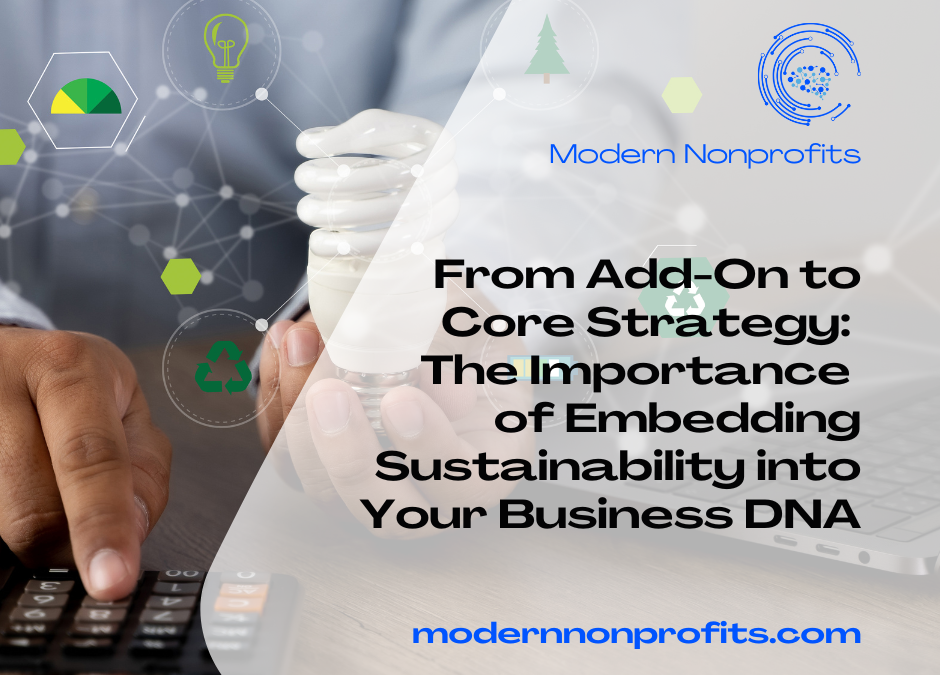Sustainability has become a buzzword in recent years, and for a good reason. With the increasing awareness of the environmental and social impact of human activities, consumers are becoming more conscious of the products and services they purchase. Companies that embrace sustainable practices are not only doing their part to help the planet but are also gaining a competitive advantage in the marketplace. In this article, we will explore the significance of incorporating sustainability into a company’s core strategy and the impact it can have on customer loyalty, investor confidence, and employee satisfaction. We will also discuss how the digitalization of businesses is driving the shift towards sustainable solutions and how companies can design their processes with a focus on value creation, delivery, capture, and customers to minimize negative impacts and enhance positive outcomes.
Integrating sustainability into a business strategy is no longer optional; it is an essential element that should be at the core of a company’s operations. According to a transcript, to ensure that sustainability is incorporated into a company’s strategy, it should not be viewed as an add-on, but rather as a crucial component that should be embedded into every aspect of the organization. Scania, for example, does not have a sustainability strategy; instead, the company has a sustainable strategy that encompasses every aspect of its operations.

For a company to remain relevant and competitive, it is essential to view sustainability as a business opportunity and transform itself to survive. Consumers are becoming increasingly aware of the environmental and social impact of their purchases, and they are more likely to buy from companies that have a sustainable approach to doing business. Investors are also more likely to invest in companies that demonstrate a long-term commitment to sustainability. Furthermore, employees are increasingly looking to work for companies that have a positive impact on the environment and society.
The shift towards sustainable solutions is being enabled by digitalization. Companies are increasingly adopting sustainable practices and processes that reduce their negative environmental impact. In order to evaluate the value of an offering, it is essential to reflect on four different value dimensions: value creation, value delivery, value capture, and customers.

Value creation refers to the sustainable solutions that a company can offer to its customers, which also benefit their customers’ businesses. This means that a company should focus on creating value for its customers while ensuring that it has a positive impact on the environment and society.
Value delivery refers to the activities and processes that a company deploys to deliver the promised sustainable value. Companies should ensure that their operations are sustainable and that they are taking steps to reduce their negative impact on the environment and society.
Value capture refers to the financial viability and sustainability of a company’s revenue model. A company should ensure that its revenue model is financially viable and sustainable, while also ensuring that it has a positive impact on the environment and society.
Customers refer to the target customers that a company is trying to reach with its sustainable offerings. A company should ensure that its offerings contribute to environmental, social, and economic capital.
By addressing and reflecting on these four value dimensions, companies can revise and redesign their processes to reduce negative impacts and enhance the positive impact they have on the environment and society. This approach not only helps companies to meet their sustainability goals but also creates a competitive advantage and enhances their reputation among customers, investors, and employees.

In conclusion, integrating sustainability into a business strategy is no longer optional. Companies should view sustainability as a business opportunity and transform themselves to remain relevant and competitive. By focusing on the four value dimensions of value creation, value delivery, value capture, and customers, companies can ensure that their operations are sustainable and have a positive impact on the environment and society.
Examples Of Sustainable Businesses From Around The World
Here are some examples of sustainable businesses:
- Patagonia: An outdoor clothing and gear company that has made sustainability a core part of its business strategy. They use recycled materials, reduce waste in their supply chain, and advocate for environmental causes.
- Tesla: An electric car company that aims to reduce the world’s dependence on fossil fuels. They produce vehicles that emit no emissions and are powered by renewable energy sources.
- Seventh Generation: A company that makes household cleaning and personal care products that are environmentally friendly and free from harmful chemicals. They prioritize using renewable resources and reducing waste in their production processes.
- Interface: A flooring company that aims to eliminate the negative impact of its operations on the environment by using recycled materials, reducing energy consumption, and implementing a closed-loop recycling system.
- Ecover: A company that produces eco-friendly cleaning products that are biodegradable and made from plant-based materials. They prioritize minimizing waste and reducing the use of harmful chemicals in their production processes.
These are just a few examples of sustainable businesses. There are many more companies that have embraced sustainable practices as a core part of their strategy, and this list is by no means exhaustive.

Recommendation for Further Reading
Here are a few books on the topic of sustainable business that you may find helpful for further reading:
- “Cradle to Cradle: Remaking the Way We Make Things” by William McDonough and Michael Braungart – This book explores the idea of creating products and systems that are regenerative and sustainable, rather than just reducing harm.
- “The Ecology of Commerce: A Declaration of Sustainability” by Paul Hawken – This book discusses the role of business in creating a sustainable future and offers practical solutions for implementing sustainable practices.
- “Natural Capitalism: Creating the Next Industrial Revolution” by Paul Hawken, Amory Lovins, and L. Hunter Lovins – This book argues that businesses can be more profitable and successful by adopting sustainable practices and creating a circular economy.
- “Sustainability at Work: Careers That Make a Difference” by Marilyn Waite – This book offers guidance on how to integrate sustainable practices into your career, whether you work in business, non-profits, or government.
- “The Responsible Company: What We’ve Learned From Patagonia’s First 40 Years” by Yvon Chouinard and Vincent Stanley – This book explores the sustainability practices of Patagonia and offers insights on how businesses can become more environmentally and socially responsible.
These books provide a variety of perspectives on the topic of sustainable business and offer practical guidance for individuals and organizations looking to implement sustainable practices.

Recommendation for Further Training
Here are some online courses related to sustainable business that you may find helpful:
- Sustainable Business: Big Issues, Big Changes – This course offered by Coursera is designed to help learners understand the most pressing sustainability challenges facing businesses today and develop strategies to address them.
- Sustainable Business Strategy – This course offered by Harvard Business School (HBS) Online is designed to help learners understand the relationship between business strategy and sustainability, and develop skills for creating sustainable business models.
- Business Sustainability Management – This course offered by edX is designed to help learners develop a practical understanding of sustainability and apply sustainable practices to their work.
- Business Models For Sustainability – This course offered by Coursera is designed to help learners understand how to create and implement sustainable business models that are economically viable.
- Sustainable Business Enterprises – This course offered by Coursera is designed to provide an overview of sustainable business practices, including sustainability strategy, corporate social responsibility, and stakeholder engagement.
These courses offer a variety of perspectives on the topic of sustainable business and cover a range of topics related to sustainability in business, such as strategy, innovation, and stakeholder engagement.



Excellently put together. You covered the point perfectly. I would just like to add that not only Investors but also Creditors are more likely to support and invest in this type of company.
Well done.
Thank you for your comment. I agree that also creditors are in this range, but I would like to mentor my clients to not depend on credits, but to create sustainable solutions and use the opportunities that fundraising offers. Regards, Anita
This is a very thought provoking article. I think that the age of easy access to world wide information has made adjusting for sustainability essential. People can instantly compare price, quality, usefulness, etc. with products around the world. When I retired, I was running a company that provided several types of behavioral intervention. Sustainability for us meant keeping up with the best practice, data based interventions as well as our own developments. It also meant understanding the ever-improving field of diagnosing behaviors to adjust to our client need. Although we provide a service as opposed to a product, adjustment was necessary to support sustainability so that we could be helpful.
Thanks for sharing your experience. It’s worth hearing peoples’ best practices or issues, so we can improve our own work.